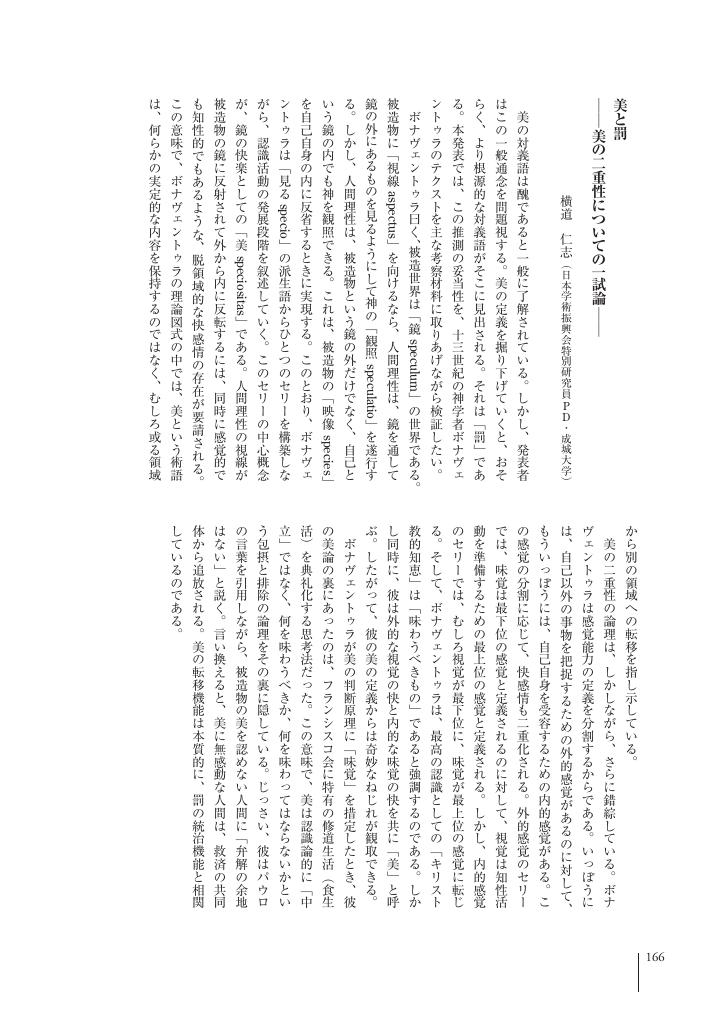1 0 0 0 OA シェリングの風景画論における気分
- 著者
- 八幡 さくら
- 出版者
- 美学会
- 雑誌
- 美学 (ISSN:05200962)
- 巻号頁・発行日
- vol.69, no.1, pp.37, 2018 (Released:2019-06-01)
Beim Betrachten einer Landschaft kann man innerlich ein harmonisches Gefühl mit der Natur haben. Das Gefühl wird durch die Vermischung von Subjekt und objektivem Gegenstand verursacht. Dazu betont Schelling die „Stimmung“ in der Landschaftstheorie in der Philosophie der Kunst. Der Begriff der Stimmung beinhaltet nicht nur das innere Gefühl, sondern auch die Atmosphäre der Umwelt. Schelling bewertet die Landschaftsmalerei ambivalent und bemerkt, dass Landschaftsmaler „die Einheit einer Stimmung“ ausdrücken sollen. Zudem betont er in Über das Verhältnis der Kunst zur Natur, dass der Künstler den „Naturgeist“, d. h. die Produktivität der Natur, darstellen soll. Schellings Urteil über die Kunstgattung steht unter Einfluss von der Kunstlehre bei A. W. Schlegel. Darin charakterisiert er, dass Landschaftsmaler „die musikalische Einheit“ in ihre Werke legen. Um Schellings Landschaftstheorie zu begreifen, vergleiche ich seine Theorie mit Schlegels. Danach analysiere ich die Anwendung seiner Theorie auf konkrete Landschaftsmalereien von J. A. Koch, den Schelling sehr schätzt. Anschließend interpretiere ich, dass die Stimmung eine Art des Gefühls im Subjekt nicht nur im Maler, sondern auch im Betrachter ist, das Objekt der unbewußten Seite mit dem Subjekt der bewußten Seite zu vereinigen.
1 0 0 0 OA フリードリヒ・シュレーゲルの初期思想における「逆説」
- 著者
- 山口 沙絵子
- 出版者
- 美学会
- 雑誌
- 美学 (ISSN:05200962)
- 巻号頁・発行日
- vol.69, no.1, pp.25, 2018 (Released:2019-06-01)
Paradox is one of the central concepts in the early philosophy of Friedrich Schlegel (1772-1829) and underlies his unique theoretical endeavors. This study examines its meaning, function and significance, which have, despite its apparent importance, rarely been independently discussed. While paradox has often been identified with logical self-contradiction, a historical contextualization shows that in Schlegel’s time, it was primarily understood in its most etymologically fundamental meaning, namely as “contrary to expectation”. When Schlegel encouraged the quality of being paradoxical as desirable in philosophy, he was aiming for a confrontation with the reader’s preconceived assumptions (be it socially shared or more personal). It is, as Kant argued, often a hazardous enterprise to entertain a paradoxical opinion. However, according to Jacobi’s interpretation of Lessing’s paradoxes, the contradiction itself can operate educationally; it prompts readers to re-examine their own beliefs and the interrelations between them. Following Jacobi in this respect, Schlegel recognizes the importance of paradoxes in their capacity to stimulate the ability of people to think for themselves. Self-contradictions, which arise only when the act of contradiction is applied self-reflexively, form the basis of Schlegel’s dialectic philosophy.
1 0 0 0 OA 美と罰 美の二重性についての一試論
- 著者
- 横道 仁志
- 出版者
- 美学会
- 雑誌
- 美学 (ISSN:05200962)
- 巻号頁・発行日
- vol.68, no.2, pp.166, 2017 (Released:2019-01-02)
1 0 0 0 OA トスカーナ大公国初期におけるコレクション陳列室 「カリオペの書斎」からトリブーナへ
- 著者
- 古川 萌
- 出版者
- 美学会
- 雑誌
- 美学 (ISSN:05200962)
- 巻号頁・発行日
- vol.68, no.2, pp.165, 2017 (Released:2019-01-02)
1 0 0 0 OA ベルクソンと映画 ミシェル・ジョルジュ=ミシェルによる二つのインタビューをめぐって
- 著者
- 大石 和久
- 出版者
- 美学会
- 雑誌
- 美学 (ISSN:05200962)
- 巻号頁・発行日
- vol.68, no.2, pp.164, 2017 (Released:2019-01-02)
- 著者
- 大愛 崇晴
- 出版者
- 美学会
- 雑誌
- 美学 (ISSN:05200962)
- 巻号頁・発行日
- vol.68, no.2, pp.162, 2017 (Released:2019-01-02)
1 0 0 0 OA 「編纂」の教育的/芸術的意義 エドワード・ブロウによる近代イタリア思想の見取り図
- 著者
- 郡田 尚子
- 出版者
- 美学会
- 雑誌
- 美学 (ISSN:05200962)
- 巻号頁・発行日
- vol.68, no.2, pp.163, 2017 (Released:2019-01-02)
1 0 0 0 OA フランソワ・ブーシェをめぐる批評 受容層の拡大に伴う評価基準の多様化
- 著者
- 太田 みき
- 出版者
- 美学会
- 雑誌
- 美学 (ISSN:05200962)
- 巻号頁・発行日
- vol.68, no.2, pp.160, 2017 (Released:2019-01-02)
1 0 0 0 OA イコノクラスムの〈感性学〉 その修辞学・身体論・ドラマトゥルギーを読み解く
- 著者
- 下山 大助
- 出版者
- 美学会
- 雑誌
- 美学 (ISSN:05200962)
- 巻号頁・発行日
- vol.68, no.2, pp.157, 2017 (Released:2019-01-02)
1 0 0 0 OA 聖母の白い聖心(みこころ) 「ルターの薔薇」成立前夜
- 著者
- 蜷川 順子
- 出版者
- 美学会
- 雑誌
- 美学 (ISSN:05200962)
- 巻号頁・発行日
- vol.68, no.2, pp.158, 2017 (Released:2019-01-02)
1 0 0 0 OA 高松次郎の「謎」を解く 後期〈平面上の空間〉シリーズにおけるマティスの「影響」
- 著者
- 岩見 亮
- 出版者
- 美学会
- 雑誌
- 美学 (ISSN:05200962)
- 巻号頁・発行日
- vol.68, no.2, pp.155, 2017 (Released:2019-01-02)
1 0 0 0 OA 明治時代の回遊式庭園にみる西洋の美的感性の影響 無鄰菴を例として
- 著者
- スコルシ ワナ ロレダナ
- 出版者
- 美学会
- 雑誌
- 美学 (ISSN:05200962)
- 巻号頁・発行日
- vol.68, no.2, pp.154, 2017 (Released:2019-01-02)
1 0 0 0 OA 日本工芸の分水嶺 漆芸家・髙橋節郎の一九五〇年代の活動に着目して
- 著者
- 南 有里子
- 出版者
- 美学会
- 雑誌
- 美学 (ISSN:05200962)
- 巻号頁・発行日
- vol.68, no.2, pp.159, 2017 (Released:2019-01-02)
1 0 0 0 OA シェリングの風景画論における雰囲気 主観と客観の協働として
- 著者
- 八幡 さくら
- 出版者
- 美学会
- 雑誌
- 美学 (ISSN:05200962)
- 巻号頁・発行日
- vol.68, no.2, pp.153, 2017 (Released:2019-01-02)
1 0 0 0 OA 映像と音の同期に関する考察 〇・一秒のリアリティー
- 著者
- 桑原 圭裕
- 出版者
- 美学会
- 雑誌
- 美学 (ISSN:05200962)
- 巻号頁・発行日
- vol.68, no.2, pp.161, 2017 (Released:2019-01-02)
- 著者
- 武藤 太郎
- 出版者
- 美学会
- 雑誌
- 美学 (ISSN:05200962)
- 巻号頁・発行日
- vol.68, no.2, pp.156, 2017 (Released:2019-01-02)
1 0 0 0 OA M・ガイガーの美学史観と現象学的美学
- 著者
- 峯尾 幸之介
- 出版者
- 美学会
- 雑誌
- 美学 (ISSN:05200962)
- 巻号頁・発行日
- vol.68, no.2, pp.152, 2017 (Released:2019-01-02)
1 0 0 0 OA 表象的特性としての知覚的クオリアと美的クオリア フレーゲ的表象主義にもとづく考察
- 著者
- 松﨑 俊之
- 出版者
- 美学会
- 雑誌
- 美学 (ISSN:05200962)
- 巻号頁・発行日
- vol.68, no.2, pp.147, 2017 (Released:2019-01-02)
1 0 0 0 OA 人工物の美的経験における倫理性 マルティン・ゼールの「美的承認」概念をめぐって
- 著者
- 松山 聖央
- 出版者
- 美学会
- 雑誌
- 美学 (ISSN:05200962)
- 巻号頁・発行日
- vol.68, no.2, pp.150, 2017 (Released:2019-01-02)
1 0 0 0 OA エルネスト・アンセルメにおける「音楽的時間」論
- 著者
- 舩木 理悠
- 出版者
- 美学会
- 雑誌
- 美学 (ISSN:05200962)
- 巻号頁・発行日
- vol.68, no.2, pp.146, 2017 (Released:2019-01-02)

















